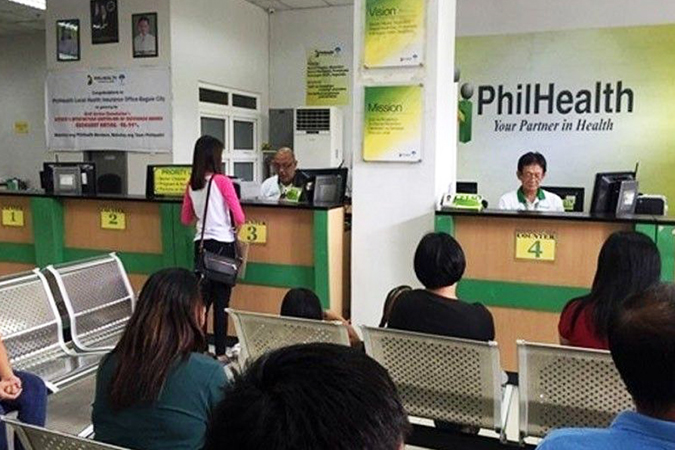OFW PhilHealth contribution hike now voluntary; law amendment in the works

FOLLOWING uproar from overseas Filipino workers (OFWs), President Rodrigo R. Duterte has ordered the Philippine Health Insurance Corp. (PhilHealth) to make their higher premium contributions voluntary. PhilHealth recently issued guidelines on the higher contribution from OFWs, which is based on the implementing rules and regulations (IRR) of the Universal Health Care (UHC) Act. The PhilHealth circular cites the new 3% rate from 2.75% last year for all direct contributors, including OFWs, earning P10,000-60,000 monthly. It also makes payments a requisite for OFWs to get permit to leave the country. Presidential Spokesperson Harry L. Roque, in briefing Monday, said Mr. Duterte has already issued the directive making the payment optional as well as not a requirement for securing an overseas employment certificate. PhilHealth President Ricardo C. Morales said in a separate briefing that they will impose a moratorium on all collection of premiums until May 30. Health Secretary Francisco T. Duque III and legislators called for a suspension, or even outright cancellation, of the mandatory increase. “I call for the suspension of Section 10.2.C of the IRR of the UHC Law in light of COVID-19 and its economic impact on OFWs,” Mr. Duque said in a social media post Monday.
LEGISLATORS
Senator Juan Edgardo M. Angara, also in a social media post, said, “PhilHealth should consider postponing/cancelling any premium rate increase. Not the time when economies are down worldwide.” Mr. Angara also questioned the legality of preventing OFWs from leaving for non-payment of the premium. Senator Juan Miguel F. Zubiri also said that while he believes the rate increase provided in the law may have its merits, its implementation at this time should be reconsidered. At the House of Representatives, ACT-CIS Party-List Rep. Jocelyn P. Tulfo said she is already drafting a bill to amend the UHC Act. “Even though curative legislation is in the works, I am hoping the PhilHealth takes the faster option of following the more OFW-friendly policy through the amendment of PhilHealth Memorandum Circular 2020-0014,” said Ms. Tulfo, vice chair of the House committee on overseas worker affairs. — Gillian M. Cortez, Charmaine A. Tadalan, Genshen L. Espedido, and Vann Marlo M. Villegas
5M more families to be included in COVID-19 cash aid
THE government’s cash aid program for low-income households affected by the lockdown measures to contain the spread of the coronavirus disease 2019 (COVID-19) will be expanded to cover an additional five million families. Presidential Spokesperson Harry L. Roque, in a briefing Monday, said the increased beneficiaries was recommended by the national task force handling the COVID-19 response. “Magbibigay pa po tayo ng ayuda sa ilalim ng Social Amelioration Program sa hindi lalampas sa five million na karagdagang pamilya doon po sa first tranche ng SAP (We will be giving aid under the Social Amelioration Program to not over five million additional families under the first tranche of the SAP),” Mr. Roque said. The amelioration program, led by the Department of Social Welfare and Development (DSWD), was initially allocated funds for 18 million families at P5,000-P8,000 per month for two months, depending on the region’s wage rate.
DAR
Meanwhile, the Department of Agrarian Reform (DAR) has authorized its regional and provincial officers to directly initiate and monitor the process for data sharing agreements with the DSWD. In a memorandum circular, Agrarian Reform Secretary John R. Castriciones granted the authority following DSWD’s announcement that it can now process and execute data sharing agreements with other national government agencies and local government units involved in the delivery of their own social amelioration measures. The data sharing agreements is provided under Republic Act 11469 or the Bayanihan to Heal as One Act. Recently, Mr. Castriciones directed Undersecretary for Support Services Offices Emily O. Padilla to implement a program to support agrarian reform beneficiaries (ARBs) amid the COVID-19 crisis. Data obtained by DAR regional field personnel will be cross-verified with those in DSWD’s database for easier identification of ARBs in need of financial support. The DAR is targeting to provide support services to 350,000 ARBs nationwide. — Gillian M. Cortez and Revin Mikhael D. Ochave
Senate approves alternative learning bill on final reading
THE Senate approved on Monday the proposed Alternative Learning System (ALS) Act on third and final reading. The bill provides a framework for the implementation of distance learning by the Department of Education (DepEd) and the Commission on Higher Education (CHEd), which is particularly crucial as schools adjust structures in the face of the coronavirus disease 2019 (COVID-19) threat. “Napakahalaga ng Alternative Learning System ni Senator Gatchalian dahil ‘yan ang makakabigay ng sistema para sa (ALS is very important because that will provide the framework for) DepEd and CHEd to start working from home or studying from home,” Senate Majority Leader Juan Miguel F. Zubiri said in a virtual briefing Monday. With 22 affirmative votes and no negative, Senate Bill No. 1365 hurdled the chamber. Eight counterpart bills are pending at the committee level at the House of Representatives. The bill defines the ALS as “a parallel learning system that provides a viable alternative to the existing formal education instruction.” It uses both non-formal and informal sources of knowledge and skills. The measure also ensures that quality education is provided in unreached, underserved and conflict-affected communities. It also provides for the training of teachers to deliver the ALS program to out-of-school youth, adults and children in extreme cases as well as learners with disabilities. — Charmaine A. Tadalan



